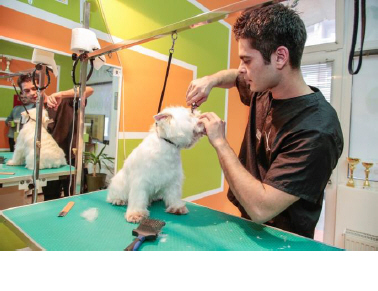An important part of Sweden’s strategy for Serbia is to support the inclusion of marginalised population groups, among which initiatives with the aim to strengthen the rights of Roma people are urgently needed. To create greater access to the labour market for such population groups in Serbia, the Swedish International Development Cooperation Agency (Sida) is supporting a project through the German non-governmental organisation Help – Hilfe zur Selbsthilfe. Project participants are supported through “in-kind grants” This means that they receive equipment for their business rather than cash grants. The project encourages socio-economic empowerment through providing assistance towards self-sufficiency, thus sustaining policies for integration and inclusion of specific population groups such as Roma.
The project is supported by Sida in collaboration with ten towns and municipalities in Serbia. The project started in 2014 and will continue until 2017. The goal is to contribute to the inclusion of marginalised people into social and economic life with a specific focus on Roma women and youth. In addition to in-kind grants, project participants receive education, training, mentoring and advisory services to achieve sustainability and create new perspectives. Consequently, the project will facilitate poverty reduction and the implementation of local sustainable development strategies.
Among the supported beneficiaries, 54 percent are engaged in provision of services, including waste collection and wood cutting services, followed by hairdressers, beauticians and others. 28 percent of supported beneficiaries are engaged in agriculture, while 18 percent are dealing with crafts. The project is gender mainstreamed, similar to 99 percent of Sida’s support to Serbia. Targeting equal representation, the project registers 44 percent women and 56 percent men.
Maja Nikolic, a 30-year old woman from Vranje, has seven years of experience as a beautician. She always wanted to open her own beauty salon, and applied for a start-up within the Sida financed project. Through in-kind grants, Maja received the essential equipment she needed. She is now the proud owner of a small start-up beauty business in the very centre of Vranje and provides her services to a growing number of satisfied customers. Within the Help project, Maja attended business training and is determined to expand her business and become a cosmetic company representative in Serbia.
Another participant in the project, Dragan Jevtic, a dog-loving 30-year old man from Pozarevac, had been working as an assistant in a groomer’s salon in Belgrade for three years. After finishing his groomer’s training, he returned to Pozarevac in 2014 and learned about the Sida funded Help project for start-up businesses. Through the project, Dragan could combine his two interests and open a groomer’s salon for pets.
Dragan’s idea was unique, interesting and clearly stated. He rented a small shop and received the necessary equipment through in-kind grants. Through the project, he completed an additional three-months training to become a certified pet groomer. Dragan’s business idea really met the market needs in Pozarevac – he is fully booked for weeks in advance.








